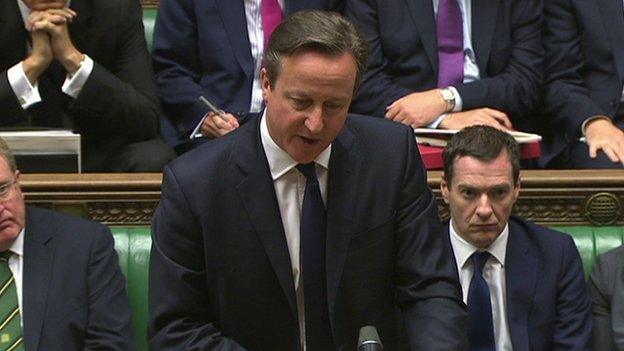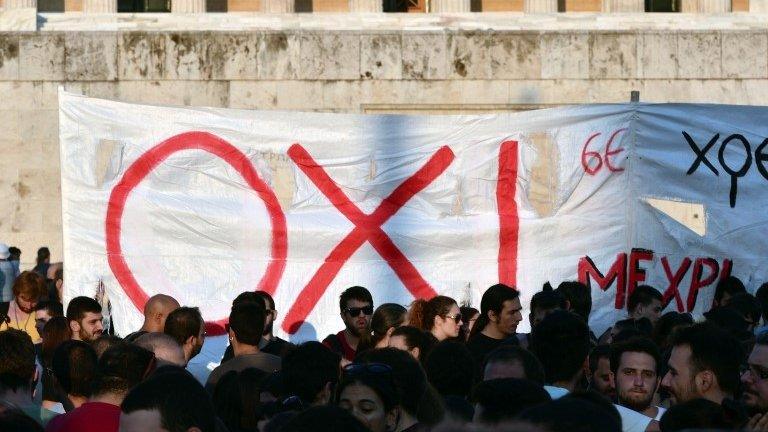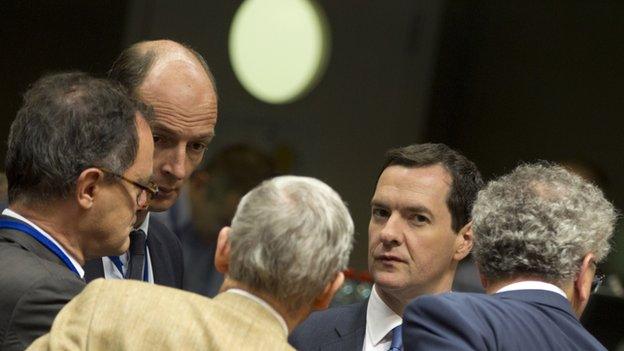Greek bailout: PM says UK won't provide interim funding
- Published

David Cameron has insisted the UK will not contribute to emergency EU funding for Greece, telling MPs that it is a matter for the eurozone to sort out.
Tory MPs are angry that the UK may have to guarantee short-term loans to Greece through an EU-wide fund despite not being a member of the single currency.
Speaking in the Commons, the PM said he had sympathy for Greece but it was "not for the UK" to bail it out.
EU officials said it was seeking a "mutually acceptable" solution.
The BBC's deputy political editor James Landale said the UK would resist "very hard" any attempt to get it to contribute interim support to Greece over the coming days and weeks through the European Financial Stability Mechanism.
While the UK may have to concede the fund's use, he said talks were under way about ensuring the British taxpayer was protected and the UK ringfenced from any liabilities.
Conservative MPs have warned the final decision may be made by EU states under qualified majority voting - so the UK could be outvoted.
The European Financial Stability Mechanism (EFSM) is an emergency fund , externalto support any of the 28 EU member states in financial difficulty. It is funded by borrowing against the EU budget, to which the UK contributes.
EU officials have said the commission has the legal right to use the fund for £12bn euros in short-term loans which could be given to Greece as part of the wider $86bn (£61bn; $95bn) rescue package agreed on Sunday.
'Slap in the face'
Using the fund could be approved if 15 countries representing 65% of the EU's population vote in favour, even if the UK and other EU members who oppose the move, such as the Czech Republic, object.
The UK could potentially be liable for approximately 15% of any request under the EFSM - in the form of a guarantee rather than a cash transfer.

A rally was held in Athens against the Greek government's agreement with its creditors
Mr Redwood said the UK should refuse to sign up to any guarantees, as to do so would be a "clear violation" of an agreement reached by David Cameron in 2010 to exclude the UK from future eurozone bailouts.
He described it as "a deliberate slap in the face for the UK" by the Commission.
And Steven Baker, co-chair of the Conservatives for Britain group, said: "UK taxpayers' money could be spent, and there'll be nothing Westminster can do to stop it."
Principle
Speaking in the Commons, Mr Cameron said that if Greece was to leave the eurozone and needed emergency humanitarian support that he expected the British people would be "generous".
But he added: "It is not for Britain to bail out eurozone countries and we would not do that... sorting out the problems of the eurozone, which he have always warned about, is a matter for eurozone countries."
David Cameron: "Britain will not be dragged into bailing out the eurozone"
British officials in Brussels said it was an "immovable principle" that the UK would not contribute to eurozone bailouts.
However, they recognised that Greece needed emergency financial support and the UK did not object to the use of the European Financial Stability Mechanism as long as UK was ringfenced from any liabilities.
EU officials have suggested a number of "collateralisation" options are being considered which might ensure this.
"We are working to find mutually acceptable solutions that can be agreed with the UK and other euro-outs to allay their concerns," a spokesman told the BBC. "We want to do this consensually."
David Cameron said in 2010 he had won a "clear and unanimous agreement" that the EFSM would not be used for further eurozone bailouts, after it was used to assist Ireland and Portugal.
Instead, responsibility was meant to fall on member states using the single currency.
It comes as the International Monetary Fund criticised the terms of Greece's latest bailout deal, saying it would take 30 years for Greece to repay all its debt to Europe and more of it would have to be written off.
- Published15 July 2015

- Published14 July 2015
